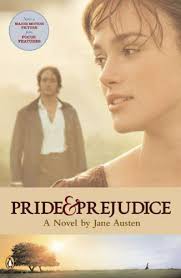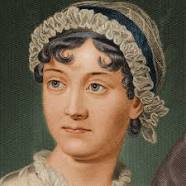Pride and Prejudice Page #12
Pride and Prejudice is a romantic novel by Jane Austen, first published in 1813. The story charts the emotional development of the protagonist, Elizabeth Bennet, who learns the error of making hasty judgments and comes to appreciate the difference between the superficial and the essential. The comedy of the writing lies in the depiction of manners, education, marriage, and money during the British Regency period.
“Oh!” cried Miss Bingley, “Charles writes in the most careless way imaginable. He leaves out half his words, and blots the rest.” “My ideas flow so rapidly that I have not time to express them--by which means my letters sometimes convey no ideas at all to my correspondents.” “Your humility, Mr. Bingley,” said Elizabeth, “must disarm reproof.” “Nothing is more deceitful,” said Darcy, “than the appearance of humility. It is often only carelessness of opinion, and sometimes an indirect boast.” “And which of the two do you call my little recent piece of modesty?” “The indirect boast; for you are really proud of your defects in writing, because you consider them as proceeding from a rapidity of thought and carelessness of execution, which, if not estimable, you think at least highly interesting. The power of doing anything with quickness is always prized much by the possessor, and often without any attention to the imperfection of the performance. When you told Mrs. Bennet this morning that if you ever resolved upon quitting Netherfield you should be gone in five minutes, you meant it to be a sort of panegyric, of compliment to yourself--and yet what is there so very laudable in a precipitance which must leave very necessary business undone, and can be of no real advantage to yourself or anyone else?” “Nay,” cried Bingley, “this is too much, to remember at night all the foolish things that were said in the morning. And yet, upon my honour, I believe what I said of myself to be true, and I believe it at this moment. At least, therefore, I did not assume the character of needless precipitance merely to show off before the ladies.” “I dare say you believed it; but I am by no means convinced that you would be gone with such celerity. Your conduct would be quite as dependent on chance as that of any man I know; and if, as you were mounting your horse, a friend were to say, 'Bingley, you had better stay till next week,' you would probably do it, you would probably not go--and at another word, might stay a month.” “You have only proved by this,” cried Elizabeth, “that Mr. Bingley did not do justice to his own disposition. You have shown him off now much more than he did himself.” “I am exceedingly gratified,” said Bingley, “by your converting what my friend says into a compliment on the sweetness of my temper. But I am afraid you are giving it a turn which that gentleman did by no means intend; for he would certainly think better of me, if under such a circumstance I were to give a flat denial, and ride off as fast as I could.” “Would Mr. Darcy then consider the rashness of your original intentions as atoned for by your obstinacy in adhering to it?” “Upon my word, I cannot exactly explain the matter; Darcy must speak for himself.” “You expect me to account for opinions which you choose to call mine, but which I have never acknowledged. Allowing the case, however, to stand according to your representation, you must remember, Miss Bennet, that the friend who is supposed to desire his return to the house, and the delay of his plan, has merely desired it, asked it without offering one argument in favour of its propriety.” “To yield readily--easily--to the persuasion of a friend is no merit with you.” “To yield without conviction is no compliment to the understanding of either.” “You appear to me, Mr. Darcy, to allow nothing for the influence of friendship and affection. A regard for the requester would often make one readily yield to a request, without waiting for arguments to reason one into it. I am not particularly speaking of such a case as you have supposed about Mr. Bingley. We may as well wait, perhaps, till the circumstance occurs before we discuss the discretion of his behaviour thereupon. But in general and ordinary cases between friend and friend, where one of them is desired by the other to change a resolution of no very great moment, should you think ill of that person for complying with the desire, without waiting to be argued into it?” “Will it not be advisable, before we proceed on this subject, to arrange with rather more precision the degree of importance which is to appertain to this request, as well as the degree of intimacy subsisting between the parties?” “By all means,” cried Bingley; “let us hear all the particulars, not forgetting their comparative height and size; for that will have more weight in the argument, Miss Bennet, than you may be aware of. I assure you, that if Darcy were not such a great tall fellow, in comparison with myself, I should not pay him half so much deference. I declare I do not know a more awful object than Darcy, on particular occasions, and in particular places; at his own house especially, and of a Sunday evening, when he has nothing to do.” Mr. Darcy smiled; but Elizabeth thought she could perceive that he was rather offended, and therefore checked her laugh. Miss Bingley warmly resented the indignity he had received, in an expostulation with her brother for talking such nonsense. “I see your design, Bingley,” said his friend. “You dislike an argument, and want to silence this.” “Perhaps I do. Arguments are too much like disputes. If you and Miss Bennet will defer yours till I am out of the room, I shall be very thankful; and then you may say whatever you like of me.” “What you ask,” said Elizabeth, “is no sacrifice on my side; and Mr. Darcy had much better finish his letter.” Mr. Darcy took her advice, and did finish his letter. When that business was over, he applied to Miss Bingley and Elizabeth for an indulgence of some music. Miss Bingley moved with some alacrity to the pianoforte; and, after a polite request that Elizabeth would lead the way which the other as politely and more earnestly negatived, she seated herself. Mrs. Hurst sang with her sister, and while they were thus employed, Elizabeth could not help observing, as she turned over some music-books that lay on the instrument, how frequently Mr. Darcy's eyes were fixed on her. She hardly knew how to suppose that she could be an object of admiration to so great a man; and yet that he should look at her because he disliked her, was still more strange. She could only imagine, however, at last that she drew his notice because there was something more wrong and reprehensible, according to his ideas of right, than in any other person present. The supposition did not pain her. She liked him too little to care for his approbation. After playing some Italian songs, Miss Bingley varied the charm by a lively Scotch air; and soon afterwards Mr. Darcy, drawing near Elizabeth, said to her: “Do not you feel a great inclination, Miss Bennet, to seize such an opportunity of dancing a reel?” She smiled, but made no answer. He repeated the question, with some surprise at her silence. “Oh!” said she, “I heard you before, but I could not immediately determine what to say in reply. You wanted me, I know, to say 'Yes,' that you might have the pleasure of despising my taste; but I always delight in overthrowing those kind of schemes, and cheating a person of their premeditated contempt. I have, therefore, made up my mind to tell you, that I do not want to dance a reel at all--and now despise me if you dare.”
Translation
Translate and read this book in other languages:
Select another language:
- - Select -
- 简体中文 (Chinese - Simplified)
- 繁體中文 (Chinese - Traditional)
- Español (Spanish)
- Esperanto (Esperanto)
- 日本語 (Japanese)
- Português (Portuguese)
- Deutsch (German)
- العربية (Arabic)
- Français (French)
- Русский (Russian)
- ಕನ್ನಡ (Kannada)
- 한국어 (Korean)
- עברית (Hebrew)
- Gaeilge (Irish)
- Українська (Ukrainian)
- اردو (Urdu)
- Magyar (Hungarian)
- मानक हिन्दी (Hindi)
- Indonesia (Indonesian)
- Italiano (Italian)
- தமிழ் (Tamil)
- Türkçe (Turkish)
- తెలుగు (Telugu)
- ภาษาไทย (Thai)
- Tiếng Việt (Vietnamese)
- Čeština (Czech)
- Polski (Polish)
- Bahasa Indonesia (Indonesian)
- Românește (Romanian)
- Nederlands (Dutch)
- Ελληνικά (Greek)
- Latinum (Latin)
- Svenska (Swedish)
- Dansk (Danish)
- Suomi (Finnish)
- فارسی (Persian)
- ייִדיש (Yiddish)
- հայերեն (Armenian)
- Norsk (Norwegian)
- English (English)
Citation
Use the citation below to add this book to your bibliography:
Style:MLAChicagoAPA
"Pride and Prejudice Books." Literature.com. STANDS4 LLC, 2025. Web. 10 Jan. 2025. <https://www.literature.com/book/pride_and_prejudice_9>.




Discuss this Pride and Prejudice book with the community:
Report Comment
We're doing our best to make sure our content is useful, accurate and safe.
If by any chance you spot an inappropriate comment while navigating through our website please use this form to let us know, and we'll take care of it shortly.
Attachment
You need to be logged in to favorite.
Log In